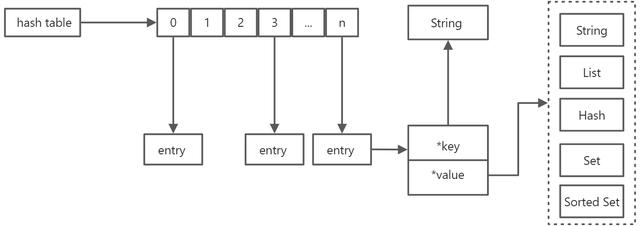Redis是一种内存数据库,所以可以很方便的直接基于内存中的数据结构,对外提供众多的接口,而这些接口实际上就是对不同的数据结构进行操作的算法,首先redis本身是一种key-value的数据库,对于value常见的类型有:
字符串(string)、散列(hash)、列表(list)、集合(set)、排序集合(sorted set)、位图(bitmaps)、地理空间索引(Geospatial indexes)、流(streams)
1.全局哈希表实现
key-value是redis中最基础的结构,key-value是采用哈希表(hash table)这种基础的数据结构来实现的,其中key是字符串类型,而value则会有上面说的各种数据类型。
哈希表是由基础的哈希函数和数组来构成了,哈希函数采用的SipHash算法,数组本身无法存储多种类型的数据,所以数组元素本身是一个指针,指向具体的元素(entry),这个entry又存储了key和value的地址,具体value也是也是一个比较复杂的数据结构,整个key-value我们可以称为全局哈希表,如下图:

通常情况下哈希表查找的平均时间复杂度是O(1),所以在Redis中按照key来查找元素的复杂度也是O(1),所以Redis对于大量的key也能保持较高的性能,但是保持高性能的前提是哈希冲突的情况比较少,随着数组不断被填满,哈希冲突的概率会不断提高,所以需要和普通的哈希表一样进行扩容,这个过程叫做rehash,rehash过程需要大量的数据搬迁工作,由于Redis是采用单线程的模型,假如要搬迁的元素过多会占用很多的CPU时间,从而导致长时间阻塞其他请求的执行,所以普通哈希表存在的问题在Redis中都会遇到,有两种情况会导致Redis性能的降低:
- 哈希冲突
- 扩容搬迁
Redis解决哈希冲突采用的办法也是链表法,这时候数组元素指针指向的是链表的头指针,当链表中元素个数过多时就会执行扩容,参考:
{
void *key;
union
{
void *val;
uint64_t u64;
int64_t s64;
double d;
}
v; struct dictEntry *next;} dictEntry;
// 字典类型定义typedef struct dictType
{
uint64_t (*hashFunction)(const void *key);
void *(*keyDup)(dict *d, const void *key);
void *(*valDup)(dict *d, const void *obj);
int (*keyCompare)(dict *d, const void *key1, const void *key2);
void (*keyDestructor)(dict *d, void *key);
void (*valDestructor)(dict *d, void *obj);
int (*expandAllowed)(size_t moreMem, double usedRatio);
/* Allow a dictEntry to carry extra caller-defined metadata. The
* extra memory is initialized to 0 when a dictEntry is allocated. */
size_t (*dictEntryMetadataBytes)(dict *d);
}
dictType;
/* This is our hash table structure. Every dictionary has two of this as we * implement incremental rehashing, for the old to the new table. */typedef struct dictht
{
dictEntry **table;
unsigned long size;
unsigned long sizemask;
unsigned long used;
}
dictht;
// hash类型定义typedef struct dict
{
dictType *type;
void *privdata;
dictht ht[2];
// -1表示没有运行rehash
long rehashidx;
/* rehashing not in progress if rehashidx == -1 */
unsigned long iterators;
/* number of iterators currently running */
}
dict;
int dictRehash(dict *d, int n)
{
// 空桶间隔 int empty_visits = n*10; /* Max number of empty buckets to visit. */ if (!dictIsRehashing(d)) return 0; while(n-- && d->ht[0].used != 0) { dictEntry *de, *nextde; /* Note that rehashidx can't overflow as we are sure there are more * elements because ht[0].used != 0 */ assert(d->ht[0].size > (unsigned long)d->rehashidx); while(d->ht[0].table[d->rehashidx] == NULL) { d->rehashidx++; if (--empty_visits == 0) return 1; } de = d->ht[0].table[d->rehashidx]; /* Move all the keys in this bucket from the old to the new hash HT */ // 搬当前嘈的整个链表 while(de) { uint64_t h; nextde = de->next; /* Get the index in the new hash table */ h = dictHashKey(d, de->key) & d->ht[1].sizemask; de->next = d->ht[1].table[h]; d->ht[1].table[h] = de; d->ht[0].used--; d->ht[1].used++; de = nextde; } d->ht[0].table[d->rehashidx] = NULL; d->rehashidx++; } /* Check if we already rehashed the whole table... */ if (d->ht[0].used == 0) { zfree(d->ht[0].table); d->ht[0] = d->ht[1]; _dictReset(&d->ht[1]); d->rehashidx = -1; return 0; } /* More to rehash... */ return 1;}static void _dictRehashStep(dict *d) { if (d->iterators == 0) dictRehash(d,1);}#define dictIsRehashing(d) ((d)->rehashidx != -1)/* Add or Overwrite: * Add an element, discarding the old value if the key already exists. * Return 1 if the key was added from scratch, 0 if there was already an * element with such key and dictReplace() just performed a value update * operation. */int dictReplace(dict *d, void *key, void *val){ dictEntry *entry, *existing, auxentry; /* Try to add the element. If the key * does not exists dictAdd will succeed. */ entry = dictAddRaw(d,key,&existing); if (entry) { dictSetVal(d, entry, val); return 1; } /* Set the new value and free the old one. Note that it is important * to do that in this order, as the value may just be exactly the same * as the previous one. In this context, think to reference counting, * you want to increment (set), and then decrement (free), and not the * reverse. */ auxentry = *existing; dictSetVal(d, existing, val); dictFreeVal(d, &auxentry); return 0;}/* Add an element to the target hash table */int dictAdd(dict *d, void *key, void *val){ dictEntry *entry = dictAddRaw(d,key,NULL); if (!entry) return DICT_ERR; dictSetVal(d, entry, val); return DICT_OK;}dictEntry *dictAddRaw(dict *d, void *key, dictEntry **existing){ long index; dictEntry *entry; dictht *ht; // 如果正在执行rehash 则执行渐进式扩容 if (dictIsRehashing(d)) _dictRehashStep(d); /* Get the index of the new element, or -1 if * the element already exists. */ // 查询下标索引 if ((index = _dictKeyIndex(d, key, dictHashKey(d,key), existing)) == -1) return NULL; /* Allocate the memory and store the new entry. * Insert the element in top, with the assumption that in a database * system it is more likely that recently added entries are accessed * more frequently. */ ht = dictIsRehashing(d) ? &d->ht[1] : &d->ht[0]; entry = zmalloc(sizeof(*entry)); entry->next = ht->table[index]; ht->table[index] = entry; ht->used++; /* Set the hash entry fields. */ dictSetKey(d, entry, key); return entry;}static long _dictKeyIndex(dict *d, const void *key, uint64_t hash, dictEntry **existing){ unsigned long idx, table; dictEntry *he; if (existing) *existing = NULL; /* Expand the hash table if needed */ if (_dictExpandIfNeeded(d) == DICT_ERR) return -1; // 同时查询两个哈希表 for (table = 0; table <= 1; table++) { idx = hash & d->ht[table].sizemask; /* Search if this slot does not already contain the given key */ he = d->ht[table].table[idx]; while(he) { if (key==he->key || dictCompareKeys(d, key, he->key)) { if (existing) *existing = he; return -1; } he = he->next; } if (!dictIsRehashing(d)) break; } return idx;}/* This is the initial size of every hash table */#define DICT_HT_INITIAL_SIZE 4static int dict_can_resize = 1;static uns







 最低0.47元/天 解锁文章
最低0.47元/天 解锁文章














 3695
3695











 被折叠的 条评论
为什么被折叠?
被折叠的 条评论
为什么被折叠?








